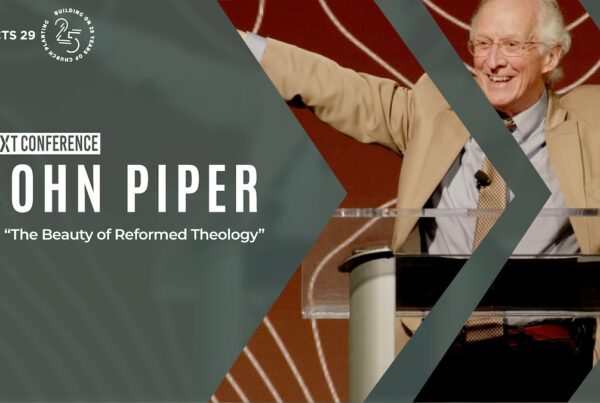In 2013, Sam Storms, along with Steve Timmis, Eric Mason, and Bob Thune, revised and expanded our Doctrinal Distinctives. In this video, Sam discusses our new Distinctives and explains why they are important.
Sam Storms is Lead Pastor for Preaching & Vision at Bridgeway Church in Oklahoma City, Oklahoma, USA.
Below are some quotations and timestamps from the video.
(3:32) “We have no desire to be different for being different sake. That’s not the purpose of these distinctives. We don’t want to just stand out in a crowd and take a position that is contrary to others. We have no impulse or instinct to do that in Acts 29. We really do believe that these distinctives make a difference in how we live and how we minister. … I’m not suggesting for a moment that in calling them ‘distinctives’ that other Christians don’t believe them. I hope and pray that most do. We’re not unique in our emphasis on these points, but we do emphasize them — that’s the point! We unite around them, we strive for them. … If you’re wondering, ‘Who are these people? What do they stand for? What matters to them?’ The answer is found in these distinctives.”
#1: We are passionate about gospel centrality.
(7:23) “The ‘gospel’ does not simply mean that you issue something along the lines of an altar call every time you preach. It is not, as some have said, simply the entry point into the Christian life; it’s not the launching pad only. It is the foundation, it is the force — the living, acting, energetic force of truth through the Spirit that really gives shape to everything we say, everything we do, how we worship, and why we live out our lives in the local church in the way that God has called us to.”
(14:36) “Acts 29 elevates gospel centrality because we want to pat ourselves on the back for doing something nobody else does? No. It’s because apart from that, Christianity is vacated, it’s void, there’s nothing left.”
#2: We enthusiastically embrace the sovereignty of God’s grace in saving sinners.
(15:40) “If I didn’t believe in the sovereignty of God, I would utterly and absolutely despair of my eternal destiny and that of everybody else to whom I minister. How can I know that God will actually bring to completion the work that he began in me if God is not truly sovereign in his saving mercy? That would fear would be utterly paralyzing. I would never be able to rest in the assurance of salvation or give such assurance to anyone else if I didn’t affirm the sovereignty of God. I would be justifiably terrified of all suffering. I could have no confidence that Romans 8:28 is really true and that God can actually turn and orchestrate it for my good and his glory. … You telling me that confidence in the sovereignty of God in the saving grace doesn’t make a difference in how you preach and how you make this gospel known?”
#3: We recognize and rest upon the necessity of the empowering presence of the Holy Spirit for all of life and ministry.
(21:46) “We have deliberately and with conscious intent, distanced ourselves from two extremes: we have on the one hand distanced ourselves from the extremes of the Word of Faith, health-and-wealth nonsense of the far reaches of the so-called ‘Charismatic’ world and we have also distanced ourselves from the cynical, angry, dogmatic spirit-quenching approach to life and ministry at the other end of the spectrum. That doesn’t mean that we’re going to try to find some bland balance in the middle. No, what it means is that we are going to be biblically robust and intentional in our pursuit of the experience of the Spirit. Not everybody in Acts 29 agrees on what gifts still operate and how they express themselves; we recognize diversity there. But we do acknowledge their importance and our responsibility to cultivate them.”
#4: We are deeply committed both to the fundamental spiritual and moral equality of male and female as well as the principle of male headship in the church and home.
(31:58) “Ours ought not to be a mentality that focuses on what women can’t do. Our aim is to equip, empower, and release them into every area of ministry, unless it is explicitly forbidden by God’s Word. We have to be guided by this truth: no Christian woman or Christian man is ever loved or served well when their ministry or position in the local church is established without regard to biblical guidelines and parameters. … You do not love, honor, or cherish either a man or a woman if you ever promote them into any arena of ministry that is outside biblical parameters — that’s not love. … That’s not biblical freedom. … Genuine freedom comes when we submit to the functional authority of Scripture.”
#5: Acts 29 embraces a missionary understanding of the local church and its role as the primary means by which God chooses to establish his kingdom on earth.
(37:31) “The church exists to make known the richly diversified, the highly variegated beauty of God’s redemptive wisdom in saving sinners through Jesus Christ. God’s goal in all he does, and through us primarily, the Church, is to glorify himself — to put on display so everybody can see the unfathomable greatness of his redemptive wisdom.”
(45:11) “Ephesians 3:10. ‘So that through the Church the manifold wisdom of God right now…’ Now. Right now, no matter how small you are, no matter how struggling you may be, no matter how many times you fail and fall down, no matter how many stupid things you do, no matter how many colossal mistakes you make … no matter how often you feel like you’re tinkering on the brink of collapse (‘Let’s just close the doors and go home’), now God through the Church is manifesting his manifold wisdom. That’s why Acts 29 exists. That’s why we’re here to plant churches that plant churches.”











